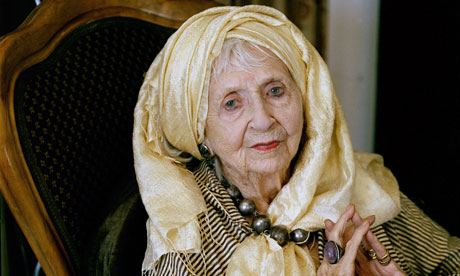
I'm not one of those people who reads cookbooks in bed. Who wants to go to sleep feeling hungry? Who wants to dream about cheese? But I've been making an exception to this rule just lately for a little book called Round the World in Eighty Dishes by Lesley Blanch, which was first published in 1956, and has now been reprinted by Grub Street just in time for Christmas. This is a cookbook that reads more like Tintin than Elizabeth David, more like Rider Haggard than Marguerite Patten. The first time I opened it, my eye fell pretty much at random on a recipe for a dish of honeyed potatoes from Albania known as Bandit's Joy – and I was hooked. I think it's fair to say that they just don't make them like this any more.
"I must confess that I was once rather friendly with a bandit in the Balkans," Blanch had written above her list of ingredients. "He had behaved so badly that he could no longer come down to the village where his family lived, for both the police and the soldiers were after him. But, as I knew his sister, she used to take me with her when she visited him in his mountain hideout, bringing him cartridges for his gun. He was a very handsome creature, and always dressed most elaborately. His head was shaved, but he had enormous black moustachios." A bandit? A mountain hang-out? Guns? The adventures of your average 21st-century cookbook writer begin – and end – with a morning visit to their cold frames.
But then, Lesley Blanch broke the mould all round. "I don't belong in England," she once said. "I don't belong anywhere." She was born in Chiswick, west London, in 1904, to a father who "did nothing", and a mother who liked to read the Qur'an over breakfast in bed. At St Paul's school, her favourite book was On Sledge and Horseback to the Outcast Siberian Lepers. At 17, she ran off with The Traveller, a man 25 years her senior, to Corsica, where they lived with his Montenegrin aunt and a giant sheepdog known as Hondof (as in Hondof the Baskervilles). After the Slade School of Art, she designed jackets for Faber, until she moved to Vogue, where she was features editor. In 1945, she married Romain Gary, the novelist, aviator and diplomat, a marriage which lasted until he left her for the actress Jean Seberg. Whenever she travelled, which was what she did most of the time, she took with her an icon, and a silver christening mug for drinking "in remote areas". Her book, The Wilder Shores of Love, about the allure of Islam and the Middle East for four aristocratic western women, has never been out of print since its publication in 1954. Her friends included Nancy Mitford, Rebecca West and the Duchess of Windsor. She liked reggae and Bob Dylan. She died in the south of France in 2007.
Around the World in Eighty Dishes is brilliant fun. To me, there is something hilarious about sentences like: "My outstanding memory of Sardinia is the local breed of donkeys, very small, the size of large dogs." But since I do understand that this kind of thing won't have everyone cracking up, I should tell you about the recipes, too. They are quite strange, having been written for austerity Britain. Tinned goods feature prominently, as do cream cheese and curry powder. Many of the recipes are excessively sweet, a reflection, perhaps, that sugar had only recently ceased to be rationed. You will certainly find better tips for fondu, risotto and imam baildi elsewhere.
On the other hand, the book contains many things you will definitely not find elsewhere. Blanch was apt to make things up, and perhaps this goes as much for her cookbook as for her biographies. The Zombie's Secret, a dish she claims comes from Haiti, is a repulsive-sounding mixture of avocado, banana, coconut and cream, over which one pours sweet coffee essence. (Zombies, she says, are famously good around the kitchen, being mostly quiet, and in possession of small appetites.) Or take her Eskimo Coffee, in which gulls' eggs and sugar are beaten into strong black coffee ("Try it with ordinary hens' eggs," she advises). The recipe was given to her "by the man who has been appointed the first Postmaster at the North Pole," she writes smoothly, brooking no argument. It should be served "frothy", and will do for a celebration on any cold day – including, one assumes, Christmas morning, should a copy of the book somehow have inveigled its way happily into your stocking.

